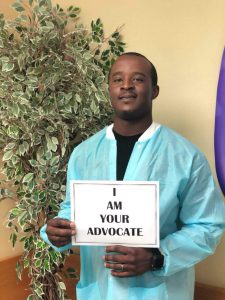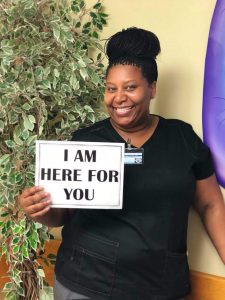Resources
NOTICE TO THE PUBLIC
The Virgin Islands Board of Nurse Licensure serves to protect the public welfare. This Board is alerting the public of the need to view nurses’ licenses and nurse assistant certificates before allowing nursing services to be provided in your home. It is imperative that the public ask pertinent questions of individuals, before home care is provided, to you and your loved ones. Asking pertinent questions, evaluating the responses and viewing the licenses or certificates will help to assure that you and your loved ones receive safe care.
When you are hiring persons to provide services in your home, it is imperative that you know the qualifications, competencies, and responsibilities of that individual. It is also imperative that you know what activities these individuals can legally perform. Following are questions and related information to assist you:
- Does the agency/individual (RN, LPN, CNA) have a US Virgin Islands Business License?
The Department of Licenses and Consumer Affairs has requirements/standards for those who provide care in the home. - Does the individual have a certificate to work as a Certified Nursing Assistant or certification to provide Home Health?
The Virgin Islands Board of Nursing regulates Certified Nursing Assistants, Licensed Practical Nurses and Registered Nurses. The Department of Human Services trains homemakers for Elder Care through the Family Care Giver Support Services Program. - Who is the supervisor of the person providing services?
Certified Nursing Assistants and the Home Health workers must provide services under the supervision of a Licensed Nurse or Physician. Homemakers provide services with supervision from the Department of Human Services. Patient assessment must be done by a Registered Nurse.
The Consumer’s Right to Know What Is a Violation?
You have a right to know who is taking care of you or your loved ones. Whenever any health care is being provided, you should always ask of the caregiver “who are you?” and “what are your credentials?”
You also have to right to ask to see the credentials. Keep on record the following three pieces of information:
- The provider’s name
- The provider’s licensure or credentials? (for example, registered nurse, licensed practical or vocational nurse, certified nurse aide); and
- The provider’s title
What Can Consumers Expect?
Good health care providers are interested in your well being. They want to give the best quality care to you and your loved ones in order to reach optimal health for the patient. Don’t be afraid to ask your health care provider questions. They are there to help you. Here’s what you can expect:
- To see the license of your health care provider;
- To be informed of the health care provider’s professional limits or expertise of care;
- Confidentiality;
- A copy of your health care records, upon request;
- The ability to terminate the health care service at anytime;
- To know how to reach the health care provider in case of an emergency;
- A professional demeanor from your health care provider that respects your rights; and
- A choice in the involvement of your family.
State laws authorize boards of nursing to take action against nurses’ licenses for violations which may include:
- Drug and/or alcohol abuse;
- Sexual misconduct;
- Abuse-either verbal, physical or mental;
- Negligent or incompetent care;
- Theft of property;
- Misrepresentation;
- Abandonment;
- Lack of confidentiality; or
- Unprofessional conduct.
If you believe harm has been done, or if you are dissatisfied with the nursing service, or if you are questioning the behavior of your nurse for any reason, call your board of nursing at 340-249-0684/340-712-0700 or file a complaint with the VIBNL Complaint Portal.
After the Complaint is Made
Boards of nursing take complaints about nurses seriously. As soon as a complaint is received at a board of nursing, work begins. First, a determination is made as to whether or not the facts, as alleged, violate existing laws or regulations that govern the nurses’ practice. Remember.’ boards of nursing are only authorized to act against persons who are licensed or credentialed as nurses or certified nursing assistants (CNA’s).
If a violation of law or rule did indeed occur, and the violator is licensed or credentialed as a nurse or CNA, then an immediate investigation into the facts of the case is begun. Evidence is gathered and interviews are conducted.
If the evidence obtained during the investigation supports the allegation(s), and the facts are not disputed by the licensee, the board of nursing may negotiate a settlement with the licensee, outlining the facts of the violation and appropriate sanction.
If the licensee contests the charges, he/she is entitled to a formal hearing. During this hearing, both sides may present evidence and witnesses. Lawyers will be present. The board of nursing determines and issues the sanction.
Sanctions vary by board of nursing. Generally, however, it can be stated that money damages are not awarded to consumers. Below is a sample of the sanctions from which boards of nursing may choose:
- Warn, censure or reprimand the licensee;
- Impose a fine;
- Place on probation or set a condition of licensure;
- Limit the license or credential;
- Suspend the license or credential;
- Revoke the license or credential; or
- Dismiss the complaint.
Never be cautious about reporting an incompetent or unsafe nurse. You are entitled to safe nursing care. By participating in this fair process, when the situation warrants, you will have helped your board of nursing make sure that the public is protected. You are commended for your action.
Reporting to a Board of Nursing
In order to help the board of nursing investigate your complaint, here is what you should have ready to report when you call the board of nursing:
- Nurse’s name (first and last), license number, Social Security # of the nurse, if known.
- Type of Nurse (RN, CNA, LPN, APRN), if known.
- What did he/she do and with whom.
- Date, time and where it happened.







